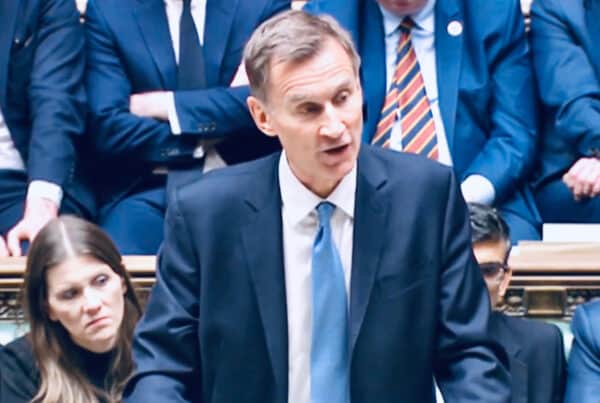
Chancellor of the Exchequer Jeremy Hunt delivered the Spring Statement today, making several big announcements, including a huge change in retirement planning.
Hunt said that the Conservative government’s approach to the economy is “on the right track” while noting they “remain vigilant” and will take steps whenever necessary to ensure economic stability.
A top priority for the Chancellor should come as no surprise is to slash inflation in half, pointing to expectations that inflation will decline from the current 10.7% to 2.9% by the end of the year. Hunt said that a recession is not in the cards for 2023.
Hunt predicted that the current budget deficit will decline in each following year going from “5.1% of GDP in 2023-24, to 3.2% in 2024-25, 2.8% in 2025-26, 2.2% in 2026-27 and 1.7% in 2027-28.”
Taking a victory lap on performance since the Tories took over, Hunt stated:
“… since 2010, we’ve grown more than major countries like France, Italy, or Japan and about the same as Europe’s largest economy Germany. We’ve halved unemployment… cut inequality …and reduced the number of workless households by one million.”
He added that the UK is the best country in Europe to do business, as well as the best country in Europe in which to invest.
In November We Delivered Stability, Today its Growth
Regarding taxes, Hunt announced programs to boost investment by offering “super deductions” and an Annual Investment Allowance of £1 million, which is expected to help 99% of all businesses which can deduct the full value of all their investment from that year’s taxable profits. Full expensing for the next three years is predicted to increase investment by 3% every year.
The Chancellor introduced a tax benefit for SMEs that spend 40% or more of their total expenditure on R & D, as they will be able to claim a credit worth £27 for every £100 they spend.
Hunt said the City of London will continue to be one of the top financial centers in the world due to competitive deregulation, and the UK government will continue to push to make the London Stock Exchange a better place to list shares.
Hunt said he was accepting all nine of the digital technology recommendations, launching an “AI Sandbox.”
“… we want the UK to be the best place in Europe for companies to locate, invest and grow so today’s enterprise measures strengthen our technology and life science sectors, invest in energy security and for three years – but I hope permanently – cut corporation tax by £9 bn a year to give us the best investment incentives of any advanced economy.”
Hunt announced a significant increase in annual tax-free pension allowance by increasing the amount from the current £40,000 to £60,000 while announcing that the lifetime allowance, currently at £1 million, will be abolished.
CI received multiple comments from Fintechs on the Chancellor’s Spring Statement.

Yoko Spirig, co-founder and CEO of Ledgy, a Swiss-based firm that has an office and clients in London, said from the view from Switzerland, the UK has always stood out as a good example of a progressive tech hub that champions innovation and balanced risk-taking.
“This is one of the key drivers for foreign direct investment and why European firms like Ledgy choose to set up offices and operations in the UK. For the UK to maintain this position and continue to attract tech firms, it needs to continue creating and fostering the optimal environment for companies to come and operate here,” said Spirig. “In recent months, there have been some concerning developments such as the closure of Tech Nation and planned cuts to the R&D tax credit scheme. These decisions had been met with widespread criticism from across the tech industry as these have historically driven innovation and tech investment in the UK.”
Spirig said the en enhanced R&D tax credit scheme for SMEs is positive for the tech ecosystem.
“This reversal, coupled with the UK government’s intervention to support tech businesses through the weekend’s Silicon Valley Bank crisis, shows the UK is still an attractive place for tech firms and will help ensure it stays out in front as a positive example for other European markets.”
Alisa DiCaprio, Chief Economist at R3 and former Chair of the Fintech Committee at the US Department of Commerce, said that if London wants to maintain its status as a top global hub for financial services, tech must be at heart of its strategy.
“Westminster has made welcome progress in creating the right environment for financial services to innovate with technology – such as its consultation on the digital pound and proposals to regulate crypto assets – but it is vital that the government maintains momentum and ensures good policy delivers world leading market conditions. We look forward to hearing more about the Treasury’s support for other fintech initiatives, like the FMI sandbox and accelerated settlement taskforce, to ensure the UK remains at the cutting edge of financial services innovation. With competition rising from Europe and elsewhere, harnessing transformative tools specific to empowering financial services, such as distributed ledger technology, is quickly becoming a central pillar of economic growth.”
Jatin Ondhia, CEO of Shojin, stated that prudence and stability were at the heart of Hunt’s Spring Budget. Ondhia said it was the hangover effect of his predecessor’s economic gamble that left little room for any wild cards.
“From the perspective of where the government and economy found themselves in late 2022, a relatively quiet Budget is not a bad thing. It shows they are being financially responsible. However, at a time when sky-high inflation is compounding the housing crisis, is no news really good news? Building costs are through the roof and access to finance remains a big issue for developers, in turn, damaging efforts to boost the UK’s housing stock.”
Ondhia described the “revolving door for housing ministers” as ridiculous with six different MPs in the role in the past year.
“…while the scrapping of mandatory housebuilding targets, means that what we needed today was some clear policies to get Britain building. While all eyes will remain on Hunt and Sunak’s conservative fiscal policies, the lack of decisive action on planning reforms, construction output and the lack of affordable homes could be a dangerous oversight. Evidently, the private sector will have to forge ahead to ensure property development continues at pace.”
The CEO of Market Financial Solutions, Paresh Raja, said it was no secret that there are issues requiring attention in the property sector.
“Clearly, as Hunt looked down his list of priorities for this particular Budget, these items were overlooked in favour of other pressing concerns. In truth, the property market could benefit from the Chancellor’s prudent economic approach. While there may not have been any noteworthy policies or investments relating specifically to property, his efforts to combat the cost-of-living crisis and bring much-needed stability to the economy should be welcomed.”
Raja said they saw how the mini-budget from last September was so tumultuous and the ill fated announcement fueled interest rate changes and uncertainty.
“Hunt has favoured a cautious approach, and the property market will likely benefit from a sense of economic calm, particularly if inflation continues to fall and interest rate hikes come to an end.”
Giles Coghlan, Chief Market Analyst, consulting for HYCM, said:
“After Kwasi Kwarteng’s mini-budget sent sterling to 37-year lows against the dollar, today’s budget was a tame affair by design, with very little in the way of surprises. Given that Mr Hunt is only the second of the past five Chancellors to deliver an official budget, the message delivered was one of stability – the fact that many of the key policies were announced in advance has allowed the Government avoid any budget-related bond market shocks. And with few big giveaways announced, traders will have their attention firmly focused on new public borrowing forecasts.”
He added that a more optimistic growth outlook from the OBR may improve the outlook for the pound slightly, as well as offer some hints as to how the Bank of England may act on interest rates on 23 March.
NEO CEO and co-founder Laurent Descout, noted that the UK is a key Fintech hub, and maintaining this status is a key priority for the UK government. He said that recently they have seen some positive moves from the Prime Minister and the Technology Secretary designed to cement the UK’s position as a “science and technology superpower by 2030,” committing hundreds of millions worth of investment in innovation.
“This, coupled with the Chancellor’s additional R&D support for SMEs spending large amounts on innovation and commitment to additional investments to tech hubs near UK universities is great news for the tech industry. From 2021 to 2022, Spin-outs from UK universities created more than 56,000 jobs and almost £6bn of investment and this investment will help ensure this success continues. As a Fintech with an office in Cambridge, we have seen first-hand the innovation taking place at UK universities and welcome the Chancellor’s support.”
Matthew Hodgson, CEO of Mosaic Smart Data, said it was great to see the government committing to tech and innovation, putting its money where its mouth is and recognizing the importance of AI.
“An annual £1m prize for AI research will go a long way in boosting the government’s pledge to make Britain the next ‘Silicon Valley’ and is a positive move in the UK’s ongoing quest to become a science and technology superpower. AI, if applied correctly, after the appropriate groundwork, can help banks unlock efficiency, productivity and profitability – and more and more firms are recognising the urgent need to harness its potential. Continued support from the government is critical if the UK is to retain its reputation as a hub for innovation in Fintech.”
Dawn Capital, GP and co-founder Haakon Overli, said the Chancellor has acted to protect the UK’s world-leading R&D tax credits, which have historically acted as a lifeline for SME technology businesses, providing tax relief ahead of being able to attract institutional funding from venture capital and other sources.
“While not as generous as the previous scheme, and how well they work in practice is yet to be seen, the partial reversal indicates that the Government has listened to the start-up community on this issue – many of our portfolio companies have benefited from the tax credits in support of the necessary R&D to drive genuine innovation here in the UK.”
Overli said the policy was illustrative of the political support from prior administrations that have helped to build UK’s status as a top destination for tech and investment in Europe.
“… today’s decision, alongside the events of the past week, suggests that UK tech may yet become a priority in Westminster once again. By excluding large companies, the Government has reduced exploitation of the system, backed real entrepreneurs and is beginning to make good on the Government’s ambition to make the UK a technology and science superpower by 2030.”
All in all, the Chancellors’ Spring Statement has been well regarded by the innovation and entrepreneurial sector – a good sign going forward.
The Spring Budget 2023 is available here.

